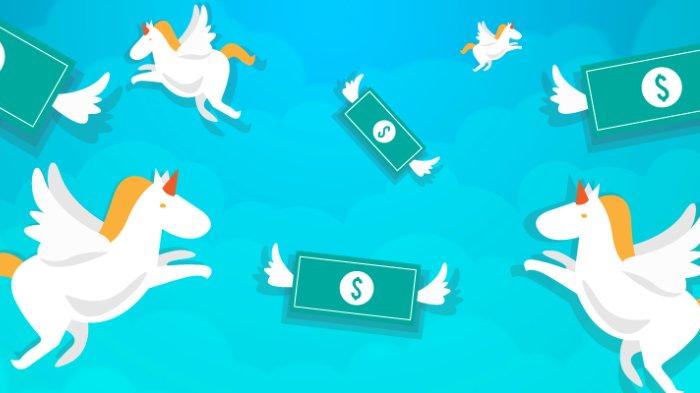Unicorn Boosts National Economy
By: Irfan Yusriadi *
The statement that states that a start-up with a unicorn status is the cause of Indonesia’s money running abroad is considered wrong. In fact, unicorns have great potential to drive the national economy. Information technology-based startups or often called start ups especially those with unicorn status are increasingly being talked about.
Senior Indonesian Stock Exchange (BEI) researcher Poltak Hontradero revealed, unicorn status start-up (valuation above 1 billion US dollars) is believed to have a positive impact on the national economy. On the contrary, the assumption as the cause of funds fleeing abroad is a form of failure to understand. He said, the investment system and structure at startup are different from ordinary companies. According to him, with the presence of investments from global investors it will bring great benefits. Enter funds in the form of American dolaar to unicorn Indonesia then managed in rupiah.
At the same time, the founders of start up continued to play a central role in all decision making in the company. Because, the founders and management were the ones who understood the genetics of the company the most. Prabowo’s misunderstanding about the unicorn ended the poor performance in the second debate. The former Kopassus Danjen is considered too much rhetoric, rarely giving context and data in his speech, a blunder on agrarian matters and its peak, the Unicorn question from Jokowi illustrates that Prabowo does not understand the digital industry.
Unicorn is definitely not “online – online,”. In the world of start-up startup companies in the field of technology as intended by Jokowi, Unicorn is a title for startups that have a valuation of more than 1 billion dollars. The term was first introduced by Aileen Lee, founder investor of Cowboy Ventures.
The term Unicorn is taken from a mythological horse species that has a single horn on the head. The Unicorn in giving its title at a start up represents the status of the fairy tale itself: rare and impossible.
When Lee coined the term, he identified 39 start-ups with unicorn status. According to his estimates, four Unicorn status start-ups will be born each year. This means that there will be around 60 unicorns in 2019. It turns out Lee’s estimate missed. The number exceeds the number 60. The biggest contributor is China which has more than 130 unicorns then followed by the United States with 85 unicorns, India 20 and Britain 7. If accumulated, all unicorns around the world hold valuations worth more than 1 trillion dollars.
One of all Unicorns in the world, Indonesia accounts for four of them. They are Gojek with 9.5 billion dollar valuations, Tokopedia 7 billion dollars, Traveloka 4.1 billion dollars, and Bukalapak 1 billion dollars. The value of a startup company is determined by various indicators. For example, investment, market share, to Gross Merchandise Value (GMV) or Gross Transaction Value (GTV), which is the total gross value of transactions made.
Valuation from the Gojek unicorn, for example, was originally created from a total funding of 3 billion dollars from seven funding sessions that have been carried out. Then, Gojek’s valuation is supported by 79.20% of Indonesia’s ride-sharing market share based on the assessment of the Business Competition Supervisory Commission (KPPU) version. Finally, Valuation was also supported by the total GTV processed by Gojek from Go-ride, Go-food, Go-pay and various other services amounting to 19 billion dollars.
As the trend of startups and investments leads to it, unicorn status is not always rare. If in the beginning Lee made the term because there were only around 30 Unicorns, now there are 300. Even the valuation of 1 billion dollars is not a “wow” thing. Investors are increasingly happy to spend to fund startups.
In the United States, for example, venture capital (VC), total funds disbursed around 99.5 billion dollars to fund various start-ups during 2018. The investment amount increased from 76.4 billion dollars in 2017 and 63.8 billion dollars in 2016. While the earliest investment (seed funding) also increased, the average startup company could invest 1.1 million dollars, that number also increased from 1 million dollars in 2017, and 0.8 million dollars in 2016.
Because the status of unicorns is no longer rare and the figure of 1 billion has become reasonable, the world of startups knows the new term: Decacorn. In Southeast Asia, Grab is Decacorn, with a valuation of around 11 billion dollars. This Singapore-based Malaysian company became Decacorn after being supported by 39 investors who poured money in 22 funding sessions.
Finance Minister Sri Mulyani has a special strategy to support private pilot companies or startups that have a valuation of more than 1 billion US dollars or unicorn companies owned by Indonesia. The strategy is to build and improve the quality of human resources (HR). According to him, natural resources are a basic need to strengthen and develop more unicorns in Indonesia.
Sri Mulyani explained, President Jokowi had given direction to the Working Cabinet to finalize the realization of the strategy to strengthen HR. Based on the direction of the president, Sri Mulyani said the Ministry of Finance was given the task of providing support for the development of unicorns carried out from upstream to downstream. The government has also succeeded in strengthening the infrastructure for the development of Unicorns and thousands of other start-ups that will grow large in Indonesia.
* The author is a Student of Ocean University
